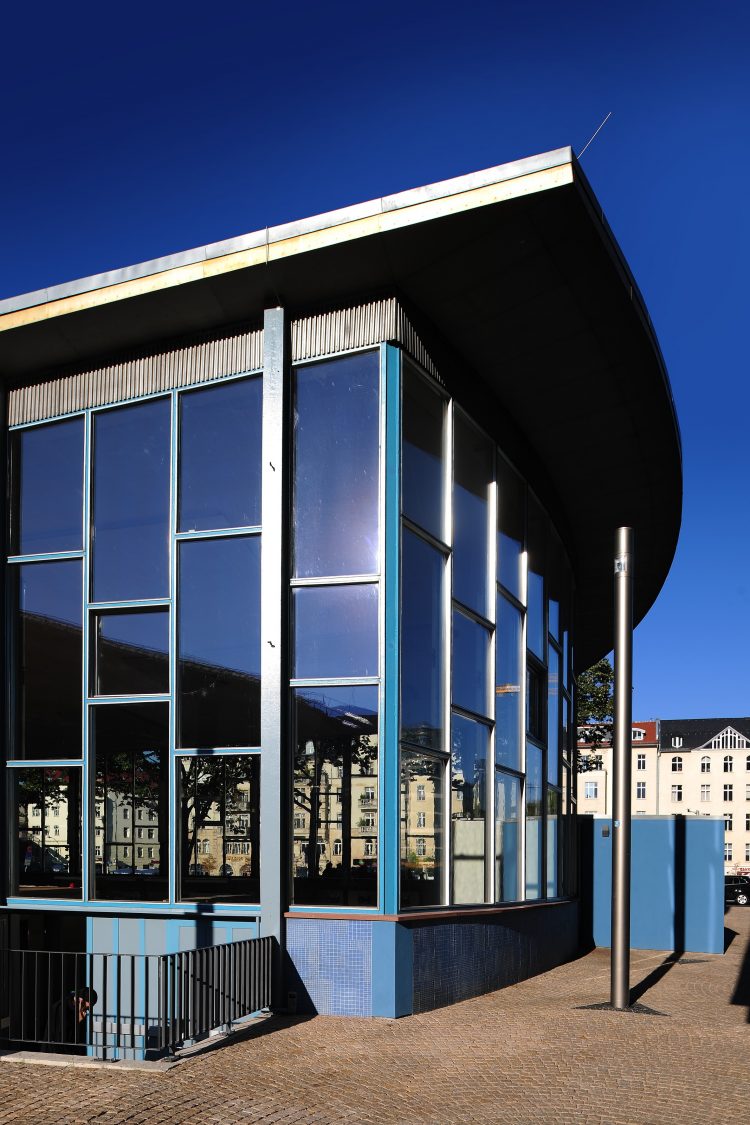SCHOTT restoration glasses with a historically authentic appearance

Optically speaking it sends the viewer back to the 1960s. In technological terms, it meets 21st century standards: the restoration glass SCHOTT TIKANA®. This is why the monument conservation authorities in Berlin chose this specialty glass for renovating the Palace of Tears in Berlin. Photo: SCHOTT
The international technology group SCHOTT offers a wide variety of architectural glasses for use in restoring old architectural monuments. The many different glasses are manufactured using the traditional Fourcault process and made to resemble window glass from various eras. Thanks to its differentiated range of materials, the company supplies glasses that meet the requirements of monument preservationists, building owners and building users. Ulrich Huber, Sales Manager for Architectural Glasses at SCHOTT Advanced Optics, will be giving a presentation on this topic at the event “Das grüne Museum” to be held in Berlin on September 25, Vienna on October 15, and Düsseldorf on October 28.
The restoration glass TIKANA® is particularly well suited for Bauhaus style buildings. Its slightly irregular surface blends in harmoniously with buildings from the classical modern. Like the other restoration glasses SCHOTT offers, TIKANA® offers all of the many possibilities when it comes to linking the historical appearance of a building with modern structural aspects.
“We recently used this glass in two different projects that involved converting historical buildings into museums, the Palace of Tears in Berlin and the Schocken department store in Chemnitz,” Huber explains. “In both projects we used our TIKANA® glass to not only meet the requirements of the monument conservation authorities but also to provide additional functions such as safety and thermal insulation by applying coatings and using a combination of materials. We thus met everyone’s needs, including the monument conservationists and restorers who were interested in protecting the buildings from vandalism and break-ins, and the building owners for whom energy efficiency plays an important role,” Huber adds.
TIKANA® glass from SCHOTT was the only material that came into question for the Palace of Tears because it imitates the slightly irregular glass used in the early 60s just perfectly. Furthermore, the TIKANA® panes were combined with a thermally coated float glass pane on the inside to meet the demands of thermal insulation.
At the Schocken department store, TIKANA® glass panes meet not only the demands for thermal insulation, but also the safety requirements. This called for a sun protection coating to be applied to the restoration glass and for it to be combined with laminated safety glass.
RESTOVER® glass from SCHOTT resembles the window glass that was manufactured around the turn of the century. Thanks to its thinness it can be installed quite easily in historical window frames and profiles. In addition, with RESTOVER® light, the company offers a less structured surface version that resembles mouth-blown glass, while RESTOVER® plus features a more distinct structure.
GOETHEGLAS is a colorless drawn glass that exhibits the irregular surface full of character that was quite common in the 18th and 19th century. It is also ideally suited for use in outdoor glazing, for protecting precious lead glazing against environmental effects and weather damages, for example.
The complete range that SCHOTT offers includes not only machine-drawn restoration glasses, but also several high-quality architectural glasses such as decorative ARTISTA® clear glass for indoor and outdoor applications, the highly transparent, colorless flat glass RIVULETTA® that features a surface that runs parallel on the one side, semi-transparent, anti-reflective MIRONA® glass and dichroitic NARIMA® effect glass. The product line also includes coated glasses such as anti-reflective AMIRAN® and MIROGARD® glass.
For further information: http://www.schott.com/architecture/english/products/index.html
AMIRAN®, ARTISTA®, MIROGARD®, MIRONA®, NARIMA®, RESTOVER®, RIVULETTA® and TIKANA® are registered trademarks of SCHOTT AG.
Download link: http://www.schott-pictures.net/presskit/258448.dasgruenemuseum
SCHOTT AG
Dr. Haike Frank
Public Relations Manager
Phone: +49 (0)6131 – 66 4088
ABOUT SCHOTT
SCHOTT is an international technology group with 130 years of experience in the areas of specialty glasses and materials and advanced technologies. SCHOTT ranks number one in the world with many of its products. Its core markets are the household appliance, pharmaceutical, electronics, optics and transportation industries. The company is strongly committed to contributing to its customers’ success and making SCHOTT an important part of people’s lives with high-quality products and intelligent solutions. SCHOTT is committed to managing its business in a sustainable manner and supporting its employees, society and the environment. The SCHOTT Group maintains close proximity to its customers with manufacturing and sales units in 35 countries. Its workforce of 15,400 employees generated worldwide sales of 1.84 billion euros for the 2012/2013 fiscal year. SCHOTT AG, with its headquarters in Mainz (Germany) is owned by the Carl Zeiss Foundation.
SCHOTT AG – Hattenbergstrasse 10 – 55122 Mainz – Germany
Phone: +49 (0)6131/66-2411 – info.pr@schott.com
Media Contact
All latest news from the category: Architecture and Construction
Newest articles

Innovative 3D printed scaffolds offer new hope for bone healing
Researchers at the Institute for Bioengineering of Catalonia have developed novel 3D printed PLA-CaP scaffolds that promote blood vessel formation, ensuring better healing and regeneration of bone tissue. Bone is…

The surprising role of gut infection in Alzheimer’s disease
ASU- and Banner Alzheimer’s Institute-led study implicates link between a common virus and the disease, which travels from the gut to the brain and may be a target for antiviral…

Molecular gardening: New enzymes discovered for protein modification pruning
How deubiquitinases USP53 and USP54 cleave long polyubiquitin chains and how the former is linked to liver disease in children. Deubiquitinases (DUBs) are enzymes used by cells to trim protein…



